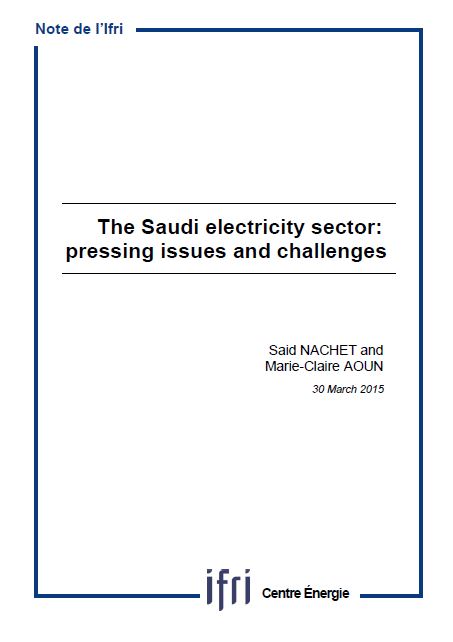The Saudi Electricity Sector: Pressing Issues and Challenges

With 266 billion barrels of proved oil reserves (16% of world total), Saudi Arabia holds the world's largest (conventional) crude oil reserves, was the largest exporter of total petroleum liquids in 2013, and the second largest petroleum liquids producer behind the United States[1].
The Kingdom has the lion share of the global oil production spare capacity, which proved to be crucial for the oil market stability on many occasions in the past, allowing Saudi Arabia to replace missing barrels from any other oil producer in the world. In the same manner, Saudi Arabia’s decision last November not to step-in and reverse the oil price decline thus, abandoning its historical role as a “swing producer,” revived the old debate on the use of oil as a “political weapon” on the international energy scene.
In addition to its well-known predominant role in the oil markets and in the Organization of Petroleum Exporting Countries (OPEC), several other features make the Kingdom of Saudi Arabia a major player in the world economy and global geopolitics...
[1] According to BP (2014).

Available in:
Regions and themes
ISBN / ISSN
Share
Download the full analysis
This page contains only a summary of our work. If you would like to have access to all the information from our research on the subject, you can download the full version in PDF format.
The Saudi Electricity Sector: Pressing Issues and Challenges
Related centers and programs
Discover our other research centers and programsFind out more
Discover all our analysesPlacing the EU on a Warfare Footing: Energy and Raw Materials Priorities for 2026
The year 2025 has confirmed that one must prepare for much worse in the field of geopolitics and geoeconomics as the intensity and frequency of shocks increase and as the European Union (EU) has no more stable flanks now that crises with the United States (US) become so frequent and reveal a systemic rift. In the world, barriers to trade multiply and dependencies are weaponized.
Brazil One Year Away from the October 2026 General Elections
Brazil’s general elections will be held on October 4, 2026, to elect the president, vice-president, members of the National Congress, governors, deputy governors and state legislative assemblies. For the presidential and gubernatorial elections, a second round will be held on October 25 if no candidate obtains a majority of the votes in the first round.
COP30: An Inflection Point for Climate Action and Governance
The 30th Conference of the Parties (COP30), opening in Belém, Brazil, on November 10th 2025, convenes at a perilous moment.
The Strategic Dimension of Skills in the Clean Industrial Deal
In the competitiveness and energy transition battles, the European Union (EU) must master a determinant factor: skills.












